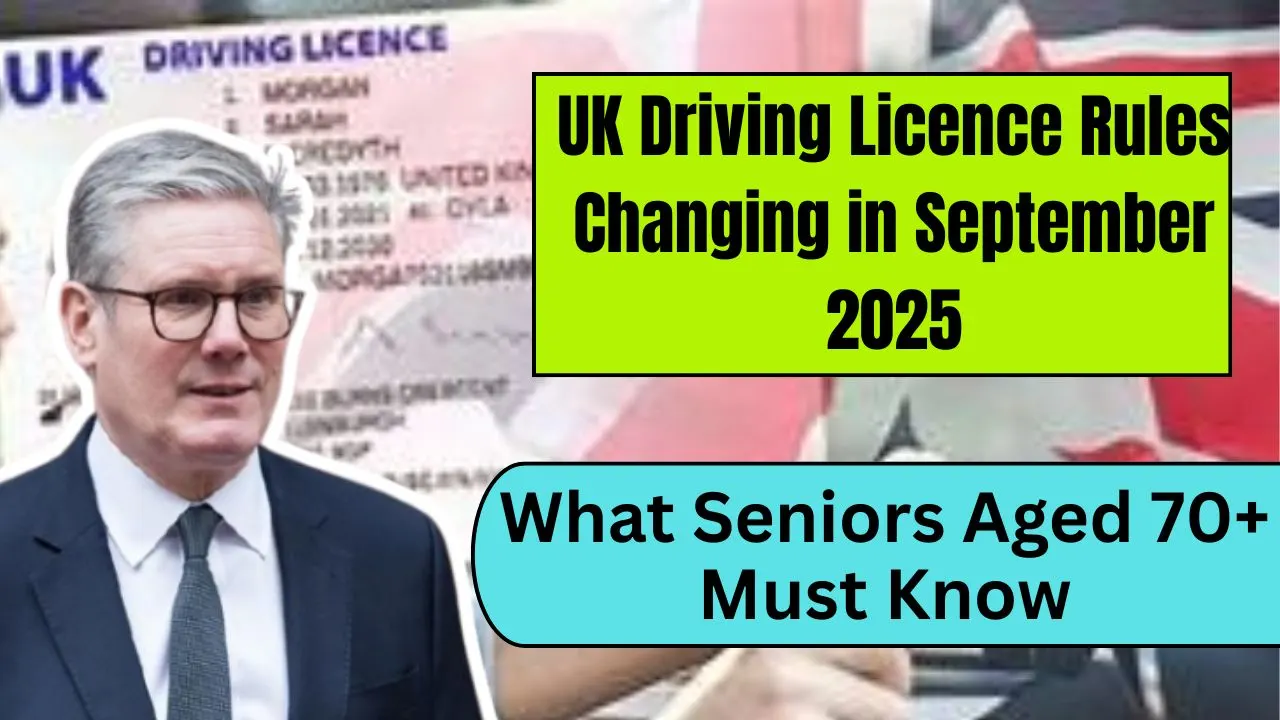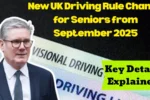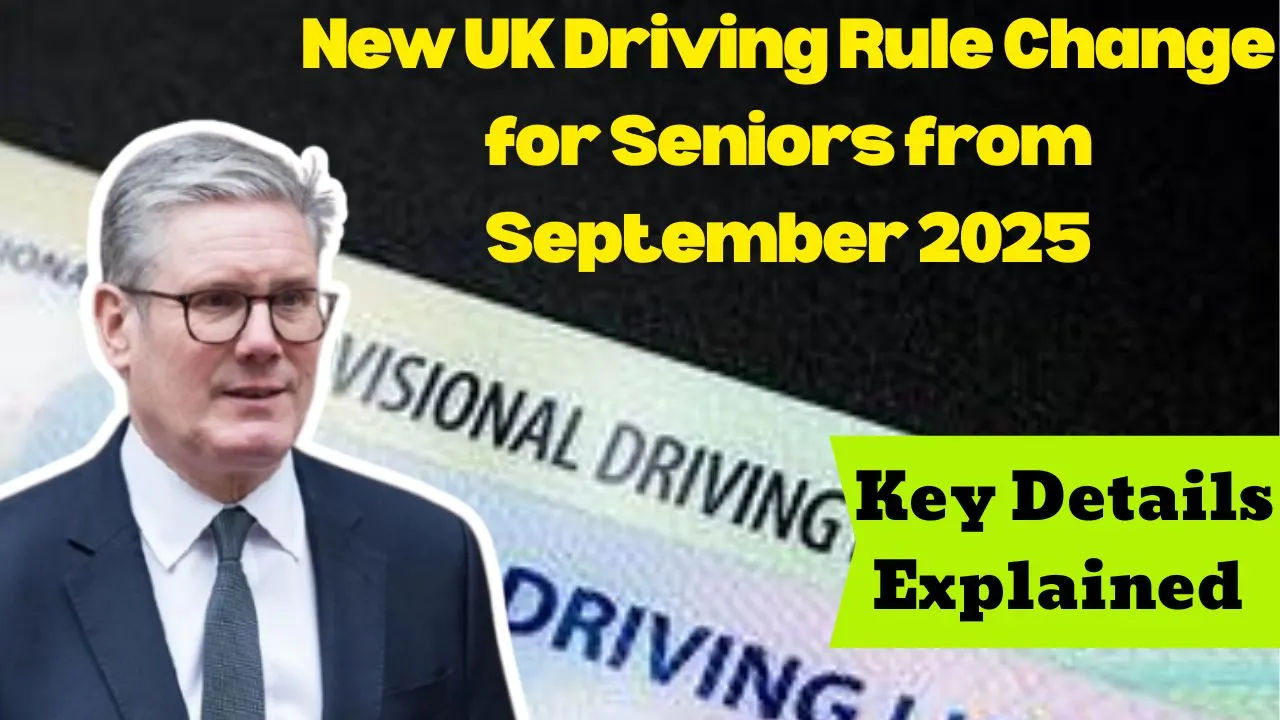The UK Driving Licence Rules are about to change in September 2025, and this update is especially important for drivers aged 70 and above. With stricter requirements around health checks and driving tests, the government is aiming to strike a balance between keeping roads safe and allowing seniors to hold onto their independence.
If you’re approaching 70 or already over the age limit, these new UK Driving Licence Rules could directly affect you. In this article, we’ll break down what’s changing, why the government is introducing these updates, who is affected, and what steps seniors can take to prepare. You’ll also find practical tips on handling the transition smoothly and staying confident behind the wheel.
Understanding UK Driving Licence Rules
The upcoming changes to the UK Driving Licence Rules have been introduced with one goal in mind: safety. Data shows that while many older drivers remain highly capable, age-related challenges like slower reaction times, reduced vision, or health conditions can increase risks on the road. By requiring drivers over 70 to pass both a medical fitness check and a practical test, the government hopes to ensure only those who are fit and skilled continue driving. This isn’t about taking away independence; it’s about giving seniors the tools to stay safe while still enjoying the freedom of the road.
Overview of the New Rules
| category | Details |
| Effective Date | September 2025 |
| Who Must Comply | All UK drivers aged 70 and above |
| Key Requirements | Medical fitness evaluation and practical driving test |
| Medical Fitness Check | Vision test, reflex assessment, and general health review |
| Practical Driving Test | Manoeuvres, hazard response, lane discipline, and traffic rule compliance |
| Booking Process | Tests booked through DVLA official channels |
| Required Documents | Current licence, proof of identity, medical certificate, DVLA forms |
| Costs & Fees | Medical: £50–£150 |
| Insurance Impact | Lower premiums for compliant drivers; higher costs for non-compliance |
| Possible Exemptions | Seniors with recent medical certificates proving fitness may be partly exempt |
Why the Rules Are Changing
The changes are being driven by safety concerns. According to recent statistics from road safety groups, drivers over 70 are more likely to experience vision problems, delayed reactions, and difficulties in high-pressure driving situations. By introducing regular checks and assessments, the government aims to reduce accident risks while also ensuring older drivers feel confident that they’re fully capable on the road.
Who Is Affected by the September 2025 Update
From September 2025, every UK driver aged 70 and above will need to comply with the updated rules. Whether you drive daily or only occasionally, the law applies to all. The only exceptions may be for seniors who already have a valid medical certificate proving their fitness to drive, but even then, most will still need to complete the practical test to renew their licence.
Overview of New Requirements
The new requirements include two important steps. First, seniors must complete a medical evaluation that looks at eyesight, reflexes, and overall health. Second, they must pass a practical driving test that examines their ability to handle modern road conditions, follow traffic rules, and manage hazards safely. These requirements ensure that older drivers remain both skilled and healthy enough to continue driving.
Medical Fitness Evaluation
The medical evaluation is not meant to be intimidating, it’s simply about ensuring safety. Seniors will be tested on vision, reflexes, and overall health. Conditions like untreated eye problems, mobility issues, or illnesses that impair judgment could affect the outcome. Passing the medical assessment is required before moving on to the driving test, making it a vital step in the renewal process.
Practical Driving Test
The practical test is designed to reflect real-life driving situations. Seniors will be assessed on skills such as parallel parking, lane discipline, hazard awareness, and responding to unpredictable scenarios. The focus is not only on technical ability but also on whether drivers can stay calm and confident in busy or complex driving environments. Passing the test is essential for licence renewal after the age of 70.
Preparing for the New Driving Tests
Preparation is the key to success. Seniors should consider regular medical check-ups to stay on top of their health, book refresher lessons with certified instructors, and practice driving in different conditions. Staying familiar with road signs, modern vehicles, and updated regulations will also make a big difference when it comes to passing both the medical and practical requirements.
Booking the Tests and Required Documentation
All tests must be booked through the DVLA’s official website or channels. Seniors will need to present their current driving licence, proof of identity, and any required forms. Having recent medical certificates ready will make the process smoother. Preparing in advance prevents delays and ensures everything runs efficiently.
Costs and Fees
Medical assessments typically cost between £50 and £150, depending on the provider. The practical driving test costs between £62 and £75. While this is an additional expense, it’s a necessary step to maintain road safety and legal compliance. In some cases, seniors may be eligible for concessions or financial support through government schemes.
Impact on Insurance
Insurance companies are expected to adjust premiums based on these new rules. Seniors who complete their tests successfully could see reduced premiums, as they’ll be considered lower risk. On the other hand, those who fail to comply may face higher premiums or difficulties renewing their policies. This makes compliance not only a legal requirement but also a smart financial decision.
Tips for Safe Driving After 70
- Avoid driving at night if your vision is weaker.
- Take breaks during long journeys to avoid fatigue.
- Use modern car technologies like lane assist or parking sensors.
- Keep up with regular exercise and check-ups to maintain reflexes and mobility.
These simple habits can help extend your driving years safely and confidently.
Conclusion
The upcoming UK Driving Licence Rules changes in September 2025 are designed to protect everyone on the road while helping seniors maintain independence. By completing both a medical evaluation and a practical driving test, drivers aged 70 and above can continue driving with peace of mind. Preparing early, staying healthy, and practicing safe driving habits will make the transition much easier.
Do you think these changes will improve safety without limiting independence? Share your thoughts in the comments, and explore more of our guides for helpful advice on driving and road safety.
FAQs
From September 2025, drivers aged 70 and above must pass both a medical fitness check and a practical driving test to keep their licence
Medical evaluations range from £50 to £150, while the practical driving test costs between £62 and £75.
Yes. Complying with the new rules could lower premiums, while non-compliance may raise them.
If the test is failed, the driver cannot legally renew their licence until they retake and pass it.
Regular medical check-ups, refresher lessons, and staying updated with road laws are the best ways to prepare.












